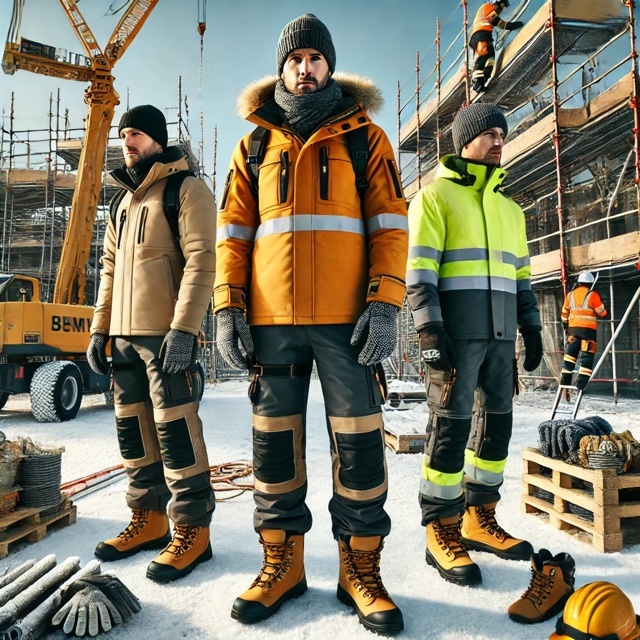
Insulated Work Trousers vs. Thermal Overalls – Which One Do You Need?
Choosing between insulated work trousers and thermal overalls is one of the most important decisions when gearing up for outdoor work in winter. Both offer protection against the cold, but their designs, flexibility, and specific features suit different tasks and industries.
At Optimum BHP Safety Store, we help thousands of professionals stay warm and safe on the job. Whether you’re working on scaffolding, in logistics, or in road maintenance, the right insulated workwear can boost comfort, productivity, and health.
Read on to discover which winter bottom layer is best for you — and explore more on our Winter Workwear FAQ and General FAQ.
👉 Check out more articles on our blog
How to Layer Winter Workwear for Maximum Warmth and Mobility
Top 10 Best-Selling Insulated Jackets for Outdoor Work in Winter 2025
How to Choose the Best Winter Workwear? A Complete Guide for Cold-Weather Jobs
How to Layer Insulated Workwear Effectively in Sub-Zero Temperatures
High Visibility Insulated Workwear: Stay Warm and Visible on the Jo
The Best Safety Shoes for Winter – What to Wear in Snow, Ice and Sub-Zero Temperatures
Understanding the Difference: Trousers vs. Overalls
Let’s break down the basic differences between these two popular options for cold weather workwear:
|
Feature |
Insulated Work Trousers |
Thermal Overalls |
|---|---|---|
|
Design |
Covers waist to ankle |
Covers torso to ankle, with suspenders/straps |
|
Layering |
Worn with base layer and jacket |
Often worn over base + mid-layer |
|
Protection |
Thermal protection for legs |
Full lower-body and core protection |
|
Flexibility |
Greater freedom of movement |
More coverage but slightly less mobility |
|
Popular Use |
Construction, general labor, logistics |
Road work, mechanics, cold storage, railwork |
🔗 Browse all insulated workwear
When to Choose Insulated Work Trousers
Insulated trousers are ideal when:
-
You need flexibility and ease of movement
-
You wear a thick winter jacket that already insulates your torso
-
You work in medium-cold environments with occasional wind exposure
-
You want to layer underneath with thermal underwear
Key features to look for:
-
Quilted or fleece-lined inner fabric
-
Windproof and waterproof outer shell
-
Multiple pockets and reinforced knees
-
EN 342 cold protection certification
Popular brands like Snickers Workwear, Portwest, and Ardon offer trousers with stretch fabric, tool pockets, and adjustable waistbands — perfect for dynamic work.
🔗 Shop insulated trousers
When to Choose Thermal Overalls
Thermal overalls are the best choice when:
-
You’re constantly exposed to snow, rain, or wind
-
You need full-body warmth without cold spots at the waist
-
You wear a mid-layer underneath but want to reduce bulk
-
You perform low-mobility tasks that require standing or kneeling
Benefits of thermal overalls:
-
Integrated coverage from chest to ankles
-
Eliminates drafts between jacket and trousers
-
Suspenders allow better ventilation and comfort
-
Often include waterproof coating and reflective strips
Overalls are frequently used in roadwork, railway operations, forestry, and cold storage warehouses.
🔗 Explore thermal overalls and coveralls
Layering Considerations for Both Options
Regardless of what you choose, layering remains essential:
-
Base Layer – Moisture-wicking thermal underwear
-
Mid Layer – Fleece vest or sweatshirt
-
Outer Layer – Trousers or overalls + winter jacket
Remember that overalls often eliminate the need for a separate mid-layer jacket, whereas trousers rely on upper body insulation.
Check our full selection of insulated jackets to complete your winter set.
Key Materials and Technologies
Look for advanced materials that enhance both insulation and durability:
|
Material |
Use & Benefit |
|---|---|
|
Softshell |
Lightweight, flexible, wind-resistant |
|
Oxford Fabric |
Rugged outer shell with high abrasion resistance |
|
Polyester Quilt |
Lightweight warmth and body heat retention |
|
PVC Coating |
100% waterproof layer |
Also look for products compliant with EN 342 (cold protection) and EN 343 (weather resistance). Many high-end models feature taped seams, adjustable cuffs, and detachable suspenders.
Best-Selling Models for Each Type
🔹 Insulated Work Trousers:
-
Snickers Workwear 6241 – AllroundWork trousers with advanced insulation
-
Portwest DX440 – Stretch trousers with quilt lining
-
Ardon 4Xstretch – Flexible and durable winter pants
🔸 Thermal Overalls:
-
Portwest S585 Bizflame Rain – Waterproof, flame-resistant overalls
-
Reis Winter Coveralls – Affordable option with quilted lining
-
CXS Canis Insulated Bib – Classic, durable, and EN-certified
Find more reviews and comparisons in our Workwear Blog
Cost Comparison: What’s the Better Investment?
Insulated trousers typically cost less than overalls, especially if you already own a winter jacket. They also wear out more slowly due to lower surface area.
Overalls offer better thermal performance, but they may cost more upfront. However, the investment pays off if you’re regularly working outdoors or exposed to harsh environments.
Final Verdict – Which Should You Choose?
Choose insulated trousers if:
✅ You work actively and need mobility
✅ Your upper body is already well-insulated
✅ You work in semi-cold environments or indoors-outdoors
Choose thermal overalls if:
✅ You work in snow, wind, or freezing temperatures daily
✅ You want full-body insulation in one piece
✅ You value protection over agility
Still unsure? Contact our specialists at Optimum BHP — we’ll help you build your full insulated workwear set including jackets, trousers, overalls, gloves, and boots.

